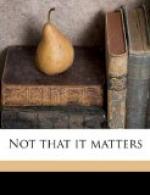To-day in my oldest clothes I have wandered through the index of The Times Literary Supplement, and I am now feeling a little ashamed of my ignorance of so many books. Of novels alone there seem to be about 900. To write even a thoroughly futile novel is, to my thinking, a work of extraordinary endurance; yet in, say, 600 houses this work has been going on, and I (and you, and all of us) have remained utterly unmoved. Well, I have been making up for my indifference this morning. I have been reading the titles of the books. That is not so good (or bad) as reading the books themselves, but it enables me to say that I have heard of such and such a novel, and in some cases it does give me a slight clue to what goes on inside.
I should imagine that the best part of writing a novel was the choosing a title. My idea of a title is that it should be something which reflects the spirit of your work and gives the hesitating purchaser some indication of what he is asked to buy. To call your book Ethnan Frame or Esther Grant or John Temple or John Merridew (I quote from the index) is to help the reader not at all. All it tells him is that one of the characters inside will be called John or Esther—a matter, probably, of indifference to him. Phyllis is a better title, because it does give a suggestion of the nature of the book. No novel with a tragic ending, no powerful realistic novel, would be called Phyllis. Without having read Phyllis I should say that it was a charming story of suburban life, told mostly in dialogue, and that Phyllis herself was a perfect dear—though a little cruel about that first box of chocolates he sent her. However, she married him in the end all right.
But if you don’t call your book Phyllis or John Temple or Mrs. Elmsley, what—I hear you asking—are you to call it? Well, you might call it Kapak, as I see somebody has done. The beauty of Kapak as a title is that if you come into the shop by the back entrance, and so approach the book from the wrong end, it is still Kapak. A title which looks the same from either end is of immense advantage to an author. Besides, in this particular case there is a mystery about Kapak which one is burning to solve. Is it the bride’s pet name for her father-in-law, the password into the magic castle, or that new stuff with which you polish brown boots? Or is it only a camera? Let us buy the book at once and find out.
Another mystery title is The Man with Thicker Beard, which probably means something. It is like Kapak in this, that it reads equally well backwards; but it is not so subtle. Still, we should probably be lured on to buy it. On the other hand, A Welsh Nightingale and a Would-be Suffragette is just the sort of book to which we would not be tempted by the title. It is bad enough to have to say to the shopman, “Have you A Welsh Nightingale and a Would-be Suffragette?” but if we forgot the title, as we probably should, and had to ask at random for a would-be nightingale and a Welsh suffragette, or a wood nightingale and a Welsh rabbit, or the Welsh suffragette’s night in gaol, we should soon begin to wish that we had decided on some quite simple book such as Greed, Earth, or Jonah.




